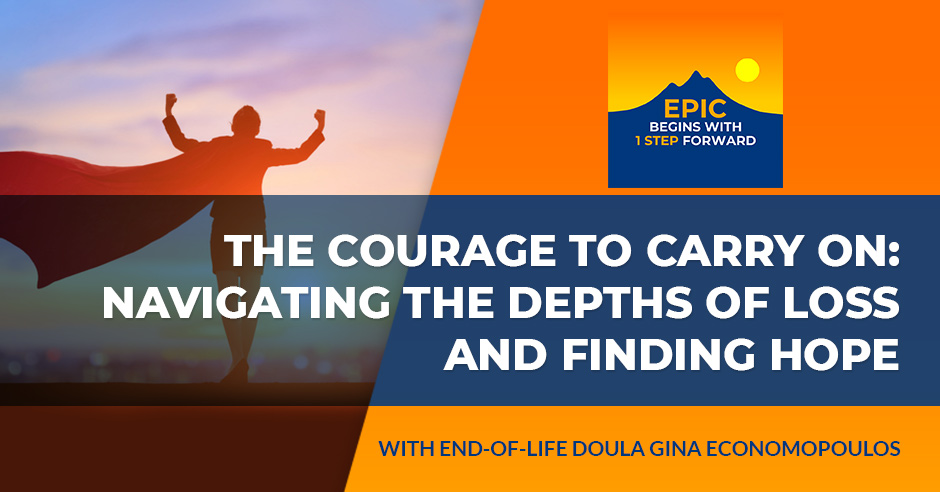Taking the first step toward change can feel intimidating, especially when navigating the overwhelming weight of overcoming loss. But what if that first step, no matter how small, is the key to unlocking an EPIC life? This episode explores that very question as End-of-Life Doula Gina Economopoulos shares her deeply personal journey through grief and adversity. It’s a narrative woven with threads of pain, resilience, and the unwavering pursuit of meaning.
We dive into the power of small actions and how they create lasting transformation, even in the face of profound sorrow. Whether you’re facing self-doubt, uncertainty, or fear, this conversation will inspire you to move forward with confidence.
Learn how shifting your mindset, setting clear intentions, and taking consistent steps can lead to powerful breakthroughs in the healing process. We’ll explore strategies for overcoming obstacles, staying motivated, and embracing progress—even when it feels slow. The journey to success isn’t about massive leaps; it’s about the courage to take that next step, no matter how small.
If you’ve been waiting for the perfect moment to start healing, this is your sign. Your EPIC future begins with one step, and that step starts today. Join us as Gina shares her most vulnerable moments, offering a roadmap for finding strength and purpose even after life’s most devastating blows. Tune in and discover how you can take action, build momentum, and create the life you’ve always envisioned. It’s time to step forward into your greatness!
Apply to be a Guest on My TV show
#EPICBeginswith1StepForward, #ZanderSprague, #EndOfLifeDoula, #Loss, #Grief
—
Watch the Episode here
Listen to the Podcast here
The Courage To Carry On: Navigating The Depths Of Loss And Finding Hope With End-Of-Life Doula Gina Economopoulos
I am so honored to be joined by Gina Economopoulos. Gina, tell us who you are and what you do.
It is such a joy and an honor to be here. I was raised on Long Island, a New York girl, and now I live on the New Jersey Shore. I am an end-of-life doula as well as a first-time author as well as an inspirational speaker. Three in one. That’s it.
A Journey In And Out Of The Convent: Searching, Loss, And Finding Faith
Gina, I know you and I have a lot to talk about. One of the subjects I cover is loss of a sibling so we’re going to talk a little about that. I have to say that when I was doing research and you contacted me about being a guest and I was looking you up, you have been on an epic journey. I want to get into some of this because you are amazing.
Thank you.
Let’s go back a little and just talk about some of the epic things that you’ve encountered and that you’ve done. One of them was that you were a nun.
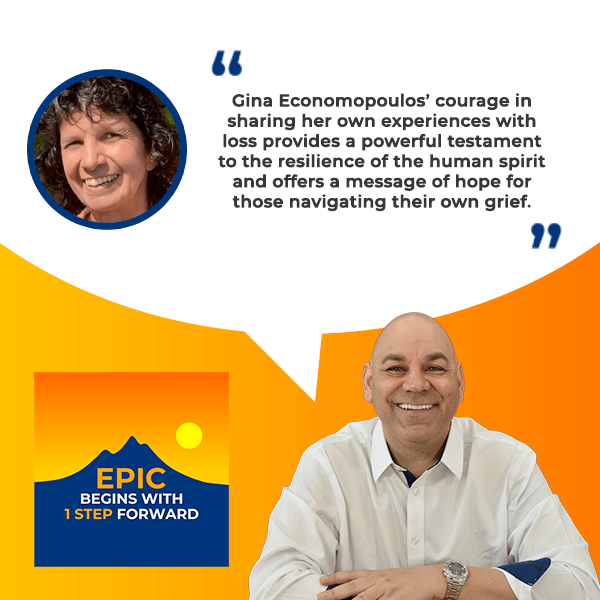
That’s correct.
Tell me about being a nun.
I was a Franciscan sister. Our community was in the South Bronx of New York. I had lived there. I was a nun for twelve years and I ministered to all the people in the South Bronx, New York City area as well as out of state. I’ve done mission trips with my community to Haiti and different places. I’ve gone throughout the world to share my story back then because I had a story. I never knew that story was going to continue after I left the nunnery.
What led you to joining a convent and then what, how did you come to the decision that you wanted to leave, that perhaps it wasn’t working for you?
I was raised Catholic. Parents devout, parents loving, went to church as a child, who needs God? Straight, went to college, lived the real college life with the alcohol. I was searching for love. Searching for love, finding it in all the wrong places. It’s a song that I could have wrote, but yet I did not. That was just my song.
After I graduated from college, my parents moved out to Pennsylvania. I decided to go live with them. It was the best option. I needed a job. What was my job? I bartended because I was so familiar with that environment, that bar environment, the college scene. I thought that was going to be my life. During that time in my third year of bartending, thinking, “I’m going to be a professional bartender, go around, make money, travel, listen, etc.”
My mom was diagnosed with cancer and given 4 to 6 months to live. She died in five months. I would say, Zander, that was my first darkness. Dark time. I was 23 years old. Mom dies. What is the meaning of life? As I said, I really didn’t have a relationship with God. Not that I didn’t believe, but I didn’t know anything. I was in this state of mind with no faith, no hope. I was crying all the time. I didn’t want to live. Yet I was searching.
Once again, searching early. I was searching for love. Now I’m searching for the meaning of life. What’s the purpose? What’s heaven? Where’s mom? That’s where I did my searching and that’s where I came back to the Catholic church. I was like, “A-ha. The resurrection,” like I got hit off the bar stool like St. Paul got hit off the horse and like a conversion experience. It’s like, “Yes, I love God. I know God.
I was 29 years old and I said, “Yeah, I’m going to join the nuns. I’m going to join the sisters. Give my life to God. Be a crusade, be a disciple, be a follower,” and I did. I encountered this community. They were young men and women because there’s friars to the community that loved God and given their life to God and working for the poor. We were followers of St. Francis. I loved it. I have a heart of service. I love, love. This is it. This is my goal. I was there, like I shared, twelve years. In those twelve years, I married God. I made final vows to God, to the church and to the community.
I’m going to live the life of poverty, chastity, obedience for the rest of my life. Yet, God had other plans during the good times of my serving the poor and being hands-on with helping people. I was having a quite difficult time with the community itself. I shared this in my memoir that I wrote. I experienced a lot of rejection, a lot of pain, hurt, betrayal, isolation. By the time I left the community, I guess it was the best option. By that time, I tried to do everything to stay in the community. Because I made final vows, like God called me, why would he not? I had to go through all these thought patterns. Ultimately, the community kicked me out politely, I’ll say.
They just said that I didn’t belong there anymore. After twelve years of putting blood, sweat and tears to them, for them and for everything I did because I gave up everything, I didn’t have nothing when I left that community. Of course, when I left, it was another time of my life that I was in another dark place. Granted, this time I had God. Before, when my mom died, I didn’t have God. Now I’m having God. I’m angry with them or confused. How can people hurt someone? I was hurt.
When you stop asking why, eventually you will see something.
On Losing A Loved One And The Struggle With “Why”
I can say that many years ago, my older sister was murdered and there were many things I thought I might encounter in my life. Certainly, we all accept that we will all experience death, experience it in our life in multiple ways and stuff. I don’t go to church a lot. I do think there is some a being. I don’t know what that is, but it was really like with your mom, it is that question of how can this happen? Why does this happen?
For me, I actually remember exactly where I was on the Massachusetts turnpike when I was wrestling with why did this happen? She was 30, I was 28. This just didn’t make sense. I had that moment and probably somewhat like you had that moment and lots of people have this moment, but I said, I will never know why my sister was taken. I need to let that go because I can spend the rest of my life trying to get that answer and I’m not going to get it. In talking with people for many years, I found a lot of people will be saying, “How could this God that’s supposed to be loving do this? How could I be hurt?” All of that. I hear what you’re saying, which is like, it’s confusing.
Very confusing. It’s so true what you say, Zander, because after my mom died, I was in such a state of sorrow, like losing my mom. I’m 23. I felt like I didn’t have anything in life. I didn’t have a husband, I didn’t have kids. I was just a bartender in here. I saw my mom die like this. I remember after that, we had the plumber coming to the house because I was still living with my dad.
I was crying to the plumber. I was crying to the plumber saying, “My mom was like this, like this. Why?” I only met this plumber once. He said to me, “When you stop asking why, you will see.” “What are you talking about?” That was a seed that was planted. Trust me, back then, I didn’t see. As time goes on, as my journey continued, I was like, “A-ha, if I stop asking why about everything, eventually I will see something.”
One of the books I wrote, it’s called Making Lemonade. It’s for siblings about sibling loss. Five of my friends who lost siblings. My whole reason of creating it was because there’s such a lack of resources for siblings. I’m like, “I need to do something.” That’s part of the work I continue to do. It’s interesting that with all of the Catholic church, Judaism and all of the religions of the world, I can’t speak for the rest of the world, but I can say in the United States, we do not deal with death at all. We treat it like it’s the most communicable disease in the world. I don’t know but my experience was, everyone knew my sister being killed, and yet no one would talk to me. I came up with this thing where I was at work and people would stop by my cube, but they wouldn’t say anything.
I put up a sign that said, “It’s okay to talk to me.” There isn’t a miracle sentence that will make it better. I don’t have one for you. You don’t have one for me. That’s okay. We have such a lack of process for dealing with death. Judaism has Shiva, other religions have things around death. It doesn’t necessarily make it easy, but it gives you, in the moment of utter devastation, something to do. Whereas here in the United States, we have a funeral. After the funeral, it’s like you fell off a cliff. I don’t know if you felt that way, but like there were all these people, too many people around when your mom died. You’re at the funeral and then it’s like the room is empty and you’re by yourself. You’re like, “Where is everyone?”
It’s so true. They’re all there. They’re all there comforting you. Everyone at the funeral kept saying, “Your mom’s at a good place and she’s at peace. She’s in heaven. She’s with God,” but she’s not with me. Don’t tell me all that. Yet, when somebody has lost someone, whether it’s a parent or a sibling, they don’t say anything. They just said, “I’m sorry for your loss.” There is no words to share with someone. To be there, to listen, but there are no words to say. As you said, magic. There’s no miracle words or magic words to tell someone.
Understanding And Coping With Grief: Acknowledgment And Expression
I never understood receiving lines until I went through it with my sister where I had gone through a few in my life and I thought, “What can I possibly say?” I guess also being a man of psychology and getting curious about why do we do things, I’ve come to the conclusion that I think receiving lines actually serve a dual purpose. It’s for each person, the person going through the line, and the person standing there receiving stuff, that it’s a dual acknowledgement of the loss where both sides get to acknowledge that loss. I feel the loss and you feel the loss and we’re each acknowledging. I think that actually is an important thing.
Unacknowledged loss and grief is incredibly devastating. I know in the sibling survivor community, sadly, we are forgotten survivors. People ask how my parents were but no one asked how I was. Your sibling relationships is the longest one you’ll have in your life. We reasonably expect that when we get to a certain age and utter about you. The number was much lower when I was younger. It’s always going out like, “Old is not 60, it’s now 80.” Let’s say people are their 80s. It is that time of our life where it is, if I could say acceptable, but we’re like this is when it is more likely that people will pass. It doesn’t make it easier. You go, “Yes, this is when this is more likely to happen than when we’re younger.
I agree with you, totally. I love your insightfulness because it is so true. According with death, even with grief. I learned the hard way. I learned through pain and suffering. When somebody’s grieving or have a loss, I don’t say a word. I’m just there. If they say anything or ask, I say, “Just keep feeling. Just keep feeling your feelings. There’s nothing wrong.” As some ethnic or culture backgrounds, we keep our feelings in. We don’t want to feel. That’s okay. Yet, in the long run, I have learned through my life and through all the trials I’ve been through, I’m a slow learner, it is like, “It’s okay to feel.” It’s okay to cry for your mom that has passed away. It’s okay to be angry. Yeah, go ahead. Be angry at the person or what happened? Yeah, why not?
Absolutely. Everyone’s Greek journey is unique. There isn’t a right way to grieve. I will say, having talked about sibling loss for many years, that there are some ways that people choose to grieve, which may not be as healthy. I don’t want to say that it’s wrong, but if you’re drinking a lot or taking drugs, that may not be your best way of coping. I’m not going to say, “You shouldn’t do that.” My own personal opinion is, I don’t know that trying to drown your sorrows in a liquor bottle or with drugs is actually going to help you on your journey.
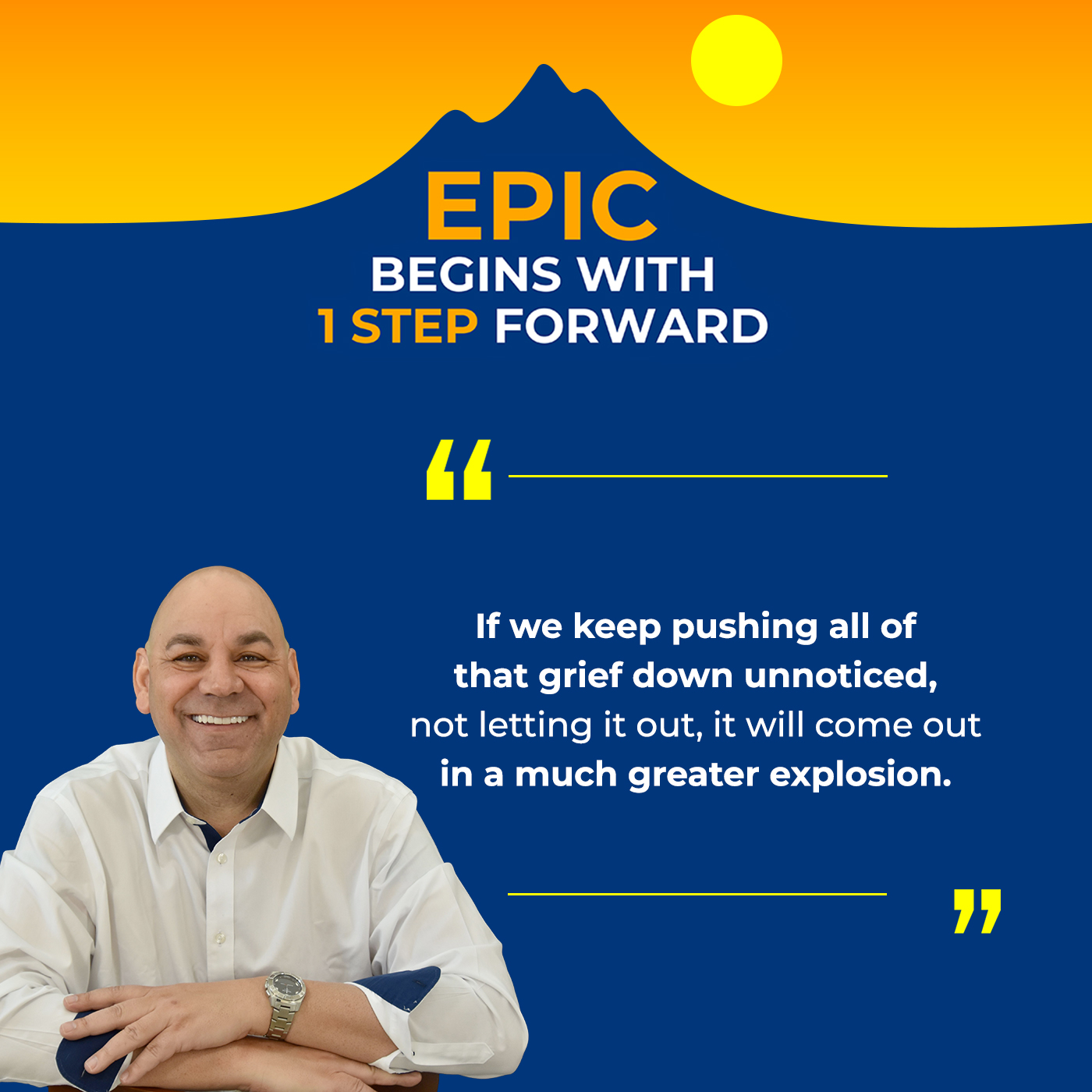
Gina’s Grief Journey: Drinking, Journaling, And Cathartic Release
To be honest, I did that when my mom died because when I drank it was to take away all the pain. Not only for my mom, but just for myself. When my mom died, I was 23. One would think I was mature had a hold on life and everything. I wasn’t, I was immature. I didn’t have faith. I was searching, finding that inner peace. I was just looking for something. I had liked to drink in college. I was a drinker, then mom dies. I’m like, “Let me just drink the pain away.” I don’t want to face it. I don’t want to embrace it. I don’t want to look at it. I want my mom back. Those are the feelings that I had.
It’s so true. There’s not a right way or wrong way. Everyone grieves differently, especially in a family, because when you’re in the family, when somebody dies, somebody goes right, somebody goes left, somebody goes this way and you’re crashing. I’ve understood that in my family. It was eight of us. I had taken care of my mom to the day she died. I was lost. My other siblings had families, they went back and we were crashing. I took it the hardest.
What I learned is that’s where they’re at, to accept everyone on how they’re grieving. As you said, there’s no right way. There is no wrong way. It’s just on how you feel. I was about to say earlier, the way I did it, my sister gave me a journal two weeks before my mom died. On the journal, that was the first time I heard of feelings. This is a book of all my feelings. I took that pen and I wrote it. I wrote one book after another. In my first year of twelve books, it was to my mom. “Why?” That’s how I dealt with it. That was my journey.
I’m sure that that was very cathartic for you to be able to release that energy. That is the thing with grieving. Grieving takes so much energy. When you mentioned certain cultures and ethnicities and stuff, like, “Keep it all in,” the problem is, if you’re not letting it out, it will get out at some point. Our bodies are wonderful machines of homeostasis. If something isn’t right, your body’s going to do something to get itself back to homeostasis.
If we keep pushing all of that grief down and not letting it out, it will come out and it usually comes out in a much greater explosion. That’s why sometimes people, you never see them cry. When you see them cry, it is a soul wrenching thing that’s because the body’s like, “No, we have got to reset this back and we are letting go of this energy.”
End-of-Life Doula: Helping With Transition And Finding Purpose
I encourage people, find some creative way to write about it. You could write angry letters to your mom, your brother, your sister, your father, whoever. It doesn’t just have to be with death. Sometimes, it’s end of a job, end of a relationship. Your pet dies. You want to write your dog you had for thirteen years. You want to write a letter to your dog and tell them how much you miss them. Absolutely. Whatever you need to do. I’m fascinated to know, let’s talk a little about being a end of life doula. You don’t have to.
No, I do. I love it. I’m like, “Yeah, it’s a passion of mine.”
Even though I think I have an idea, why don’t you explain? For people who don’t necessarily understand what an end of life doula is, what is it and how did you get to that?
End of life doula is a non-holistic approach to somebody who is dying. It’s like an extra hand with hospice. They don’t have to be in hospice to have an end-of-life doula or ask for my service. It’s just actually being, for me, to be present to them to help them transition from this life to the next. From this world to the peace, whatever denomination, whatever faith, whatever they believe or not believe. I know what I believe, but I don’t put that on them. I’m just there to say, “You are loved you. It’s okay.” They’re there with the families to help them. Some of them, of course, like you said, or we say that people are afraid of death. People don’t want to hear about death.
I try to be cautious of what I say and don’t say. I feel the people out. If they’re afraid. I go with the Holy Spirit. It is my passion. The way I got started, I had told you I took care of my mom. I was telling you that I didn’t have any faith. I didn’t have anything. She died right in front of me. I stuck by her. When I was there, the hospice came in at the end and said to me, “You’d be very good with the dying, with hospice.” I said, “No way, Jose. I’m only taking care of my mom. I’m not taking care of nobody else.” My journey continues where I receive Jesus, the taste of heaven. I’m like, “Mom, is this where you are at?”
Everyone grieves differently. There’s no right or wrong way.
I just had this spiritual experience. I’m like, “If you are there, why would you want to come back here?” I just had that kind of experience. When I was a nun, for some reason. God took that seed and let it grow because I was with many people on their deathbed from all ages and it didn’t bother me. I was just there present because I believe, and I know that every person, I don’t care who you are, what you are, what you do or didn’t do, we all have that dignity to die, that respect to die. That love to die. Some people die alone.
As a sister, they used to call me Sister Death. Some people would call me, “Sister, could you go visit Johnny at the hospital?” I would go. Sometimes they would die right there, or they’d die after I leave or the next day or the 24 hours. I always just felt like there’s such a peaceful presence at someone when they’re dying. I feel the peace. I feel like heaven’s coming in. It’s a passion. I love it. I know some people are like, “How could you love it?” I can’t say why. I don’t know why.
The Doula’s Role: Dignity, Choice, And Providing Peace
Gina, what I can say is I have a lot of enthusiasm to help my fellow siblings and to advocate for this community. I joke that we’re everywhere and we’re nowhere in the sense that there’s over a million new sibling survivors in the US every year. They’re everywhere. We’re everywhere. Yet, it’s not like we have a button or a secret handshake or hand signal that says, “I’m a sibling survivor.”
I feel you. Even though this is a really hard thing, if it is our calling, if it is what we’re good at, and you’re right, everyone deserves dignity. Most importantly, what I think is the choice, saying, “I have this choice and now I am choosing that I am going to transition.” I’m sure that you have the people who are fighting all the way until the end.
I’ve got enough experience to say I know what’s happening. When my dad passed, he was in hospice for a very short period of time, like twelve hours. He was sick and we knew what was happening. He knew what was happening. It was his choice. He got to go out. He had had sepsis and they couldn’t find it. We knew that there wasn’t medically anything that we could do. He had said a long time ago, he had a health directive that said, “I don’t want extraordinary measures if there’s nothing that can be done.”
They handed us this great book and hospice that talked about how death happens. I was like, “This would’ve been helpful 48 hours ago,” because it talks about how when people are getting ready to transition, there’s this brief period where they seem totally fine in their everything and then you’re like, “They’re getting better.” I’m like, “That would’ve been helpful,” because I saw that and we’re all like, “Look, dad’s getting better.” I look back and go, “No. That was just part of this whole process of how death really happens.”
If somebody asks for my service, I go in and it’s usually at the end or maybe the last day, or they just want to know. Sometimes it’s a patient. I had a patient just reaching out to me. He was a young kid, 15 years old, and, and we talked. We talked for about an hour. He was asking everything. He was dying of cancer. I said, “I live up the block. Whatever you want me to do, I could pray, I could listen. I could be here. However you want, whatever you want to leave this world in.”
Not that I had all these plans, but I was sharing these plans and at the end we set a prayer together, I left and he died the next day. His girlfriend reached out to me and said, “He found such peace after you left.” I don’t know what I did or said. I’m like, “That’s probably why.” Granted, I wasn’t with him for weeks or whatever. That was my purpose, just to be there for that hour just to share my experience, my heart, my love, my peace with him.
Sharing Experience And Finding Hope
A lot of times, knowledge is power. You obviously have witnessed many passings and you clearly have a heart of service. Knowledge is no good if we don’t share it. If you know something and you can share it, and you’re right. Half the time we say lots of stuff. I know when I’m helping people through grief, I say a lot of stuff and they go, “They’re so helpful.” I’m like, “What part was helpful? I just said a lot.” It doesn’t matter. They’ll find what’s helpful. They’ll take that nugget that you shared.
That’s true because I’m experienced with grief. I lost my mom. With the sisters, that was a grief, that was a hard grief of leaving the sisterhood. Later on, I lost my fiancé, Danny, to the disease of alcoholism a month before our wedding day. That was another grief episodes. I’m very good in grief. I know what grief is all about. I just pray. I am a very prayerful person. When God brings people in my life that needs whatever, if I could do it, I will help.
Be comfort, be consoled or whatever is needed. I don’t even say I understand, because I don’t understand. Granted, you might lose your mother. I’m not walking in your shoes. I don’t know. I could identify, yeah, but I never say, “I understand.” Even a loss of a sibling, I couldn’t understand that. I have all my siblings alive. I wouldn’t say, “I understand.” No, even a fiancé lost. “I understand.” No.
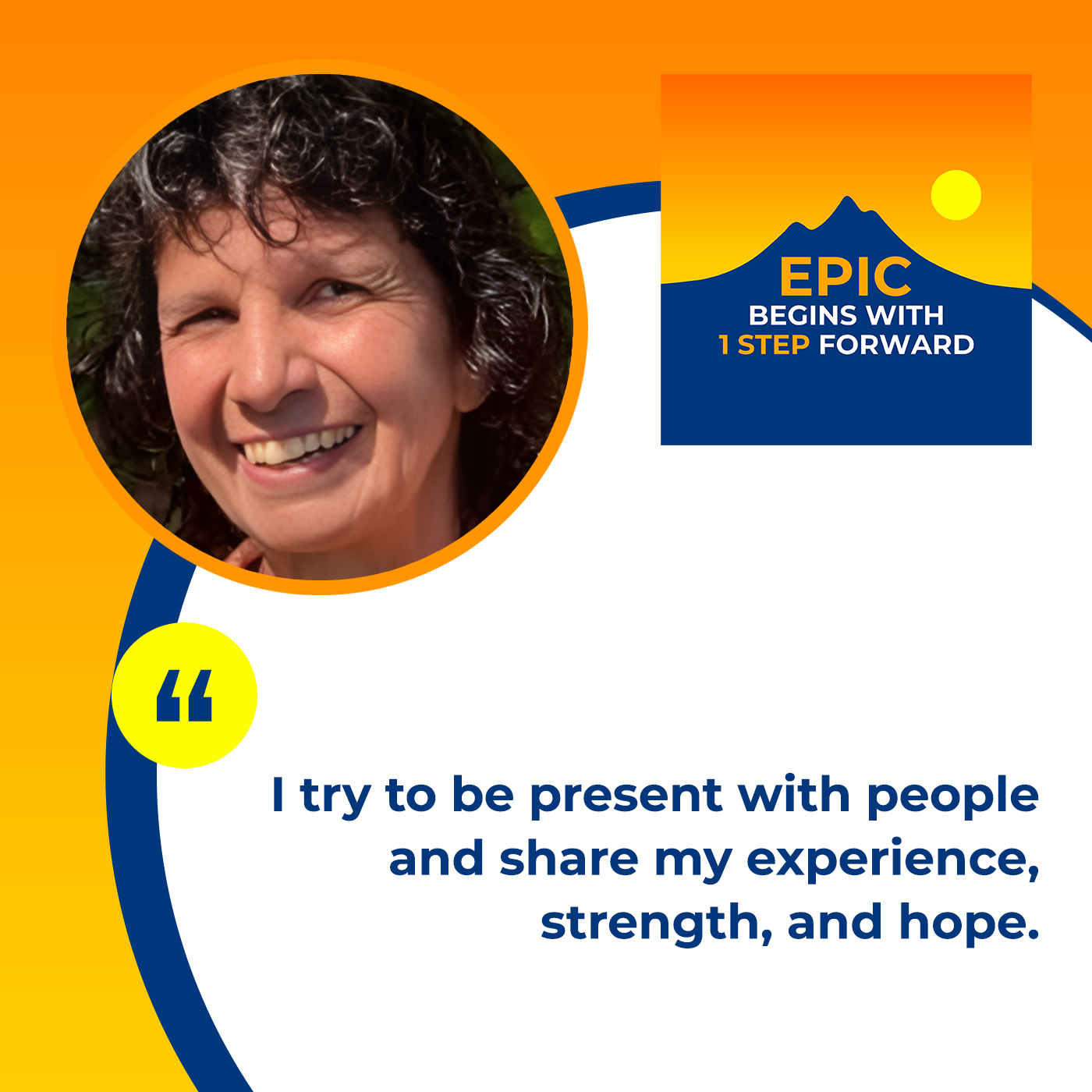
One thing I will share is that after Danny died, I had nobody. Nobody wanted to talk to me. Nobody said anything to me because Danny died. He was an alcoholic. He died of the disease. That’s a whole new stigma. It’s like, “What else am I going to learn these days?” I smile now, but yet I just try to be present to be with people and share my experience, strength, and hope. That’s why I wrote my book, my memoir. It’s all about everything, to at least help one person saying there is hope out there.
What is your book called?
It’s called Shake the Dust Off Your Feet and Walk. It’s available on Amazon.
If people want to get ahold of you, how can they do that?
Through my website. It’s ginaecon.com. There’s more about my book, about me, about blogs, about other podcasts. Also, contact if you want to contact me because I don’t care who you are, whatever you need, I’m here. You could be in Timbuktu. I’m a good prayer listener, whatever it may be.
Gina, thank you so much for that valuable work that you been doing and that you continue to do.
Thank you, Zander, I appreciate it.
No problem. I want to thank you for coming on. I want to remind everyone that if you’re ready to begin your epic journey, go to EpicBegins.com. Excitingly, if you want to appear in person in studio with me, I have a brand-new TV show called Epic Begins With One Step Forward. Go to EpicBegins.com and reach out and let me know and I’ll see if I could have you on as a guest. As always, I want to remind everyone that epic choices lead to the epic life that you want.
Important Links
About Gina Economopoulos
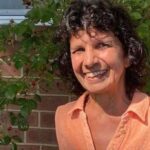 Gina Economopoulos was born in Syosset, NY, to a strong Italian and Greek-loving family. She graduated from Eastern CT State University and bartended before embarking on a 12-year convent journey after her mother’s passing. Settled on the Jersey Shore, Gina now works as an End-of-Life Doula, extending her compassionate heart to those in their final chapter. She found solace in sobriety as a proud Alcoholics Anonymous member, and her story of resilience through tragedy and faith inspires others to face life’s challenges.
Gina Economopoulos was born in Syosset, NY, to a strong Italian and Greek-loving family. She graduated from Eastern CT State University and bartended before embarking on a 12-year convent journey after her mother’s passing. Settled on the Jersey Shore, Gina now works as an End-of-Life Doula, extending her compassionate heart to those in their final chapter. She found solace in sobriety as a proud Alcoholics Anonymous member, and her story of resilience through tragedy and faith inspires others to face life’s challenges.

